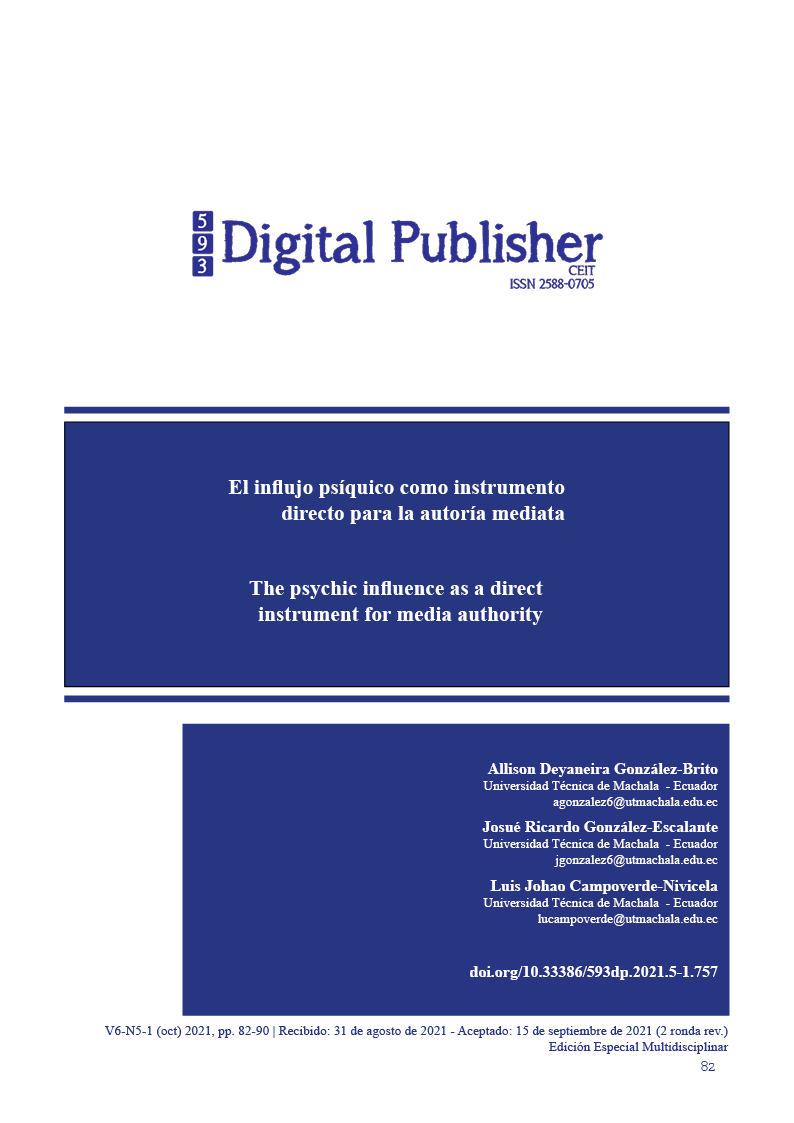The psychic influence as a direct instrument for media authority
Main Article Content
Abstract
When talking about participation and mediate authorship, it is addressed to the Comprehensive Criminal Code (COIP) of Ecuador, thus it was found that in Article 42 literal 2 it talks about those people who carry out actions such as suggestions, threats, Among others, to incite others to commit a crime, they are also considered responsible for it, despite the fact that he was not the one who carried out the action, considering themselves as mediate perpetrators, in this way the principle of collateral crime is violated, to this is attached the psychic influence, since in its vast majority it is used as a direct tool for this type of authorship, causing the person who executes the action to be directed by influences such as councils, recommendations, among others, to carry out the crime. The objective of this project was the analysis of the way that Psychic Influx intervenes as a direct instrument for mediate authorship, that is why, based on a qualitative method, the various scientific and technical concepts that are related to psychic influence were clarified as tool for mediate authorship. The principle of a criminal action is based on the illegal, the typical and the guilty act and its sanction is based on the guarantee of criminal law and the Constitution of the Republic of Ecuador.
Downloads
Article Details

This work is licensed under a Creative Commons Attribution-NonCommercial-ShareAlike 4.0 International License.
1. Derechos de autor
Las obras que se publican en 593 Digital Publisher CEIT están sujetas a los siguientes términos:
1.1. 593 Digital Publisher CEIT, conserva los derechos patrimoniales (copyright) de las obras publicadas, favorece y permite la reutilización de las mismas bajo la licencia Licencia Creative Commons 4.0 de Reconocimiento-NoComercial-CompartirIgual 4.0, por lo cual se pueden copiar, usar, difundir, transmitir y exponer públicamente, siempre que:
1.1.a. Se cite la autoría y fuente original de su publicación (revista, editorial, URL).
1.1.b. No se usen para fines comerciales u onerosos.
1.1.c. Se mencione la existencia y especificaciones de esta licencia de uso.
References
Arroyo, B. L. (2018). Una mirada crítica desde la criminología perdida en el Ecuador. Universidad del Zulia, 27(4), 95-116. Obtenido de https://www.redalyc.org/jatsRepo/122/12262987005/html/index.html
Calandria, S. (2019). Cómplices y verdugos: masculinidades, género y clase en los delitos de infanticidio (provincia de Buenos Aires, 1886-1921). História (São Paulo), 38, 1-25. doi:https://doi.org/10.1590/1980-4369e2019045
COIP, C. O. (2014). Suplemento -- Registro Oficial Nº 180. Quito: Asamblea Nacional .
Gunturiz, A. M., Castro, C. M., & Chaparro, P. E. (2020). Importancia, definición y conflictos de la autoría en publicaciones científicas. Revista Bioética, 28(1). doi:Doi: 10.1590/1983-80422020281361
Hernández, S. R., Fernández, C. C., & Baptista, L. M. (2018). METODOLOGÍA DE LA INVESTIGACION. Mexico: The McGraw-Hill Companies, I.
Herrera, A. W. (2015). La Autoría mediata y el caso Fujimori. Revista Científica Facultativa Criterio Académico, 1(2).
Iáñez, D. A., Álvarez, P. R., García, C. d., & Luque, R. V. (2019). La desmedicalización de la vida cotidiana de las mujeres: los grupos socioeducativos en el Sistema Sanitario Público Andaluz. Gac Sanit, 33(4), 398–400. doi:https://doi.org/10.1016/j.gaceta.2018.06.014
Mañalich, J. P. (2010). La estructura de la autoría mediata. Revista de derecho (Valparaíso), 34, 385 - 414. doi:http://dx.doi.org/10.4067/S0718-68512010000100011
Marcelo, C., & Denise, V. (2017). Políticas y programas de inducción en la docencia en Latinoamérica. Cadernos de Pesquisa, 47(166). doi:https://doi.org/10.1590/198053144322
NASSI-CALÒ, L. (2018). Criterios de autoría preservan la integridad en la comunicación científica. Scielo en Perspectiva. Obtenido de https://blog.scielo.org/es/2018/03/14/criterios-de-autoria-preservan-la-integridad-en-la-comunicacion-cientifica/
Orellana, C. I., & Orellana, L. M. (2020). Predictores de síntomas emocionales durante la cuarentena domiciliar por pandemia de COVID-19 en El Salvador. Actualidades en Psicología, 34(128). doi:http://dx.doi.org/10.15517/ap.v34i128.41431
Sánchez, F. F. (2019). Fundamentos epistémicos de la investigación cualitativa y cuantitativa: Consensos y disensos . Revista Digital de Investigación en Docencia Universitaria, 13(1). doi:http://dx.doi.org/10.19083/ridu.2019.644
Sánchez, P. R. (2014). La Cuestión Criminal. Ius et Praxis, 20(1), 427 - 430. doi:http://dx.doi.org/10.4067/S0718-00122014000100019
Zapata, J. M. (2017). Conceptos psicoanalíticos en discusión: el caso de la represión originaria. Perspectivas en Psicología: Revista de Psicología y Ciencias Afines, 14(2), 63-71. Obtenido de https://www.redalyc.org/pdf/4835/483555396006.pdf




